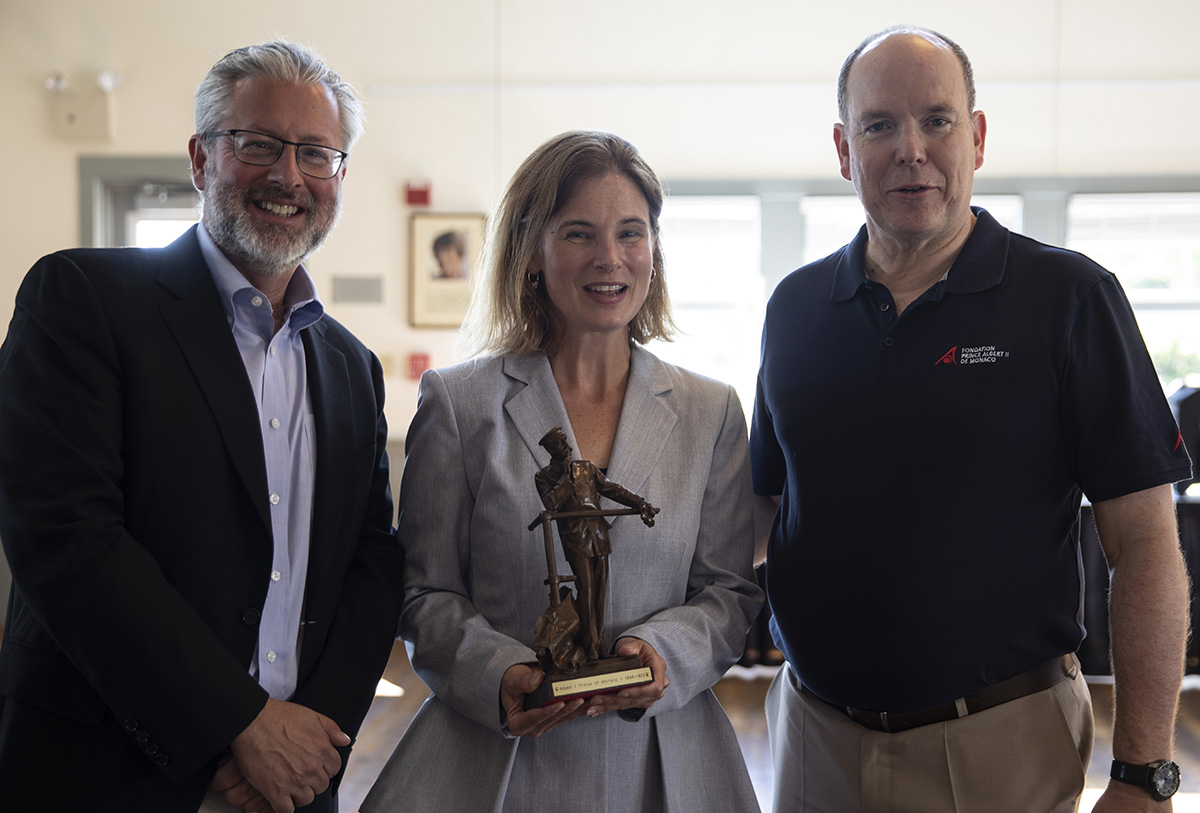Prince Albert II of Monaco Visits MBL; Explores Common Interests in Marine Science

Contact: Gina Hebert, Marine Biological Laboratory
508-717-1730; ghebert@mbl.edu
WOODS HOLE, Mass.— HSH Prince Albert II of Monaco today visited the Marine Biological Laboratory (MBL) in Woods Hole, where he demonstrated his strong commitment to marine science, exploration, and protection that is the legacy of his great-great-grandfather, the pioneering oceanographer Prince Albert I.
His Serene Highness sailed on the MBL’s research collection vessel, The Gemma; viewed thousands of cephalopods and other marine species in its Marine Resources Center; and received a comprehensive overview of the marine and environmental research to which the MBL has been devoted for more than a century.
MBL research complements the mission of the Prince Albert II of Monaco Foundation, which the Prince founded in 2006 to take direct action for the protection of nature. The foundation sponsors research, technological innovation, and initiatives for social awareness to limit the impacts of climate change, protect biodiversity, and manage water resources.
 Marine Biological Laboratory Interim Co-Directors Neil Shubin and Melina Hale with HSH Prince Albert II of Monaco. Prince Albert II (right) presented the MBL with a sculpture of his great-great-grandfather, the pioneering oceanographer Prince Albert I. The original is on display in the Oceanographic Museum of Monaco.
Marine Biological Laboratory Interim Co-Directors Neil Shubin and Melina Hale with HSH Prince Albert II of Monaco. Prince Albert II (right) presented the MBL with a sculpture of his great-great-grandfather, the pioneering oceanographer Prince Albert I. The original is on display in the Oceanographic Museum of Monaco.Credit: Daniel Cojanu/UnderCurrent Productions.
“Our oceans are greatly under threat, despite their size and their vital contributions to humanity,” Prince Albert II said during his visit to the MBL. “This is the central issue of our time, an issue that is urgent and at the same time eternal, an issue for today and for future generations. To move forward at the United Nations, in Monaco, or here on the beautiful New England coast, we have only one resource, and that is knowledge, understanding, and science. Our sole resource is all of you.”
Prince Albert II then announced his foundation’s commitment to funding SeaBase at MBL, an open-access infrastructure for integrated data on marine organisms, their genomes, their microbiomes, and the environmental status of their habitats. SeaBase will synthesize critical information for the purpose of understanding and protecting marine biodiversity and ecosystems.
“The MBL is grateful for the support of the Prince Albert II of Monaco Foundation in launching SeaBase,” said MBL Interim Co-Director Neil Shubin of the University of Chicago. “Marine ecosystems face increasing threats from habitat loss, pollution, and climate change. Understanding the mechanisms that sustain ocean health is an enormous challenge that MBL scientists are well positioned to address by investigating marine organisms and their associated microbiomes, especially changes that signal environmental stress.”
Prince Albert II attended a panel discussion, “Adapting to a Climate-Changed World,” led by Shubin and senior scientists from the MBL Ecosystems Center. The center is known for its long-term studies of ecological change, particularly in Arctic ecosystems and in coastal zones, and for its leadership in advising international policymakers on climate change.
Coming full circle, Prince Albert II ended the visit by viewing original volumes documenting the scientific discoveries of his ancestor, Prince Albert I of Monaco, who devoted much of his life to studying the oceans. Also on display was Prince Albert I’s chair from the L’Hirondelle, the first of four research vessels that he built for oceanographic exploration.
Beginning in 1885, Prince Albert I led 28 scientific expeditions in the Mediterranean and in the Arctic, taking biological samplings and oceanographic measures that were published in 65 volumes. The entire set, as well as the L’Hirondelle chair, are archived in the Marine Biological Laboratory-Woods Hole Oceanographic Institution (MBLWHOI) Library.
—###—
The Marine Biological Laboratory (MBL) is dedicated to scientific discovery – exploring fundamental biology, understanding marine biodiversity and the environment, and informing the human condition through research and education. Founded in Woods Hole, Massachusetts in 1888, the MBL is a private, nonprofit institution and an affiliate of the University of Chicago.